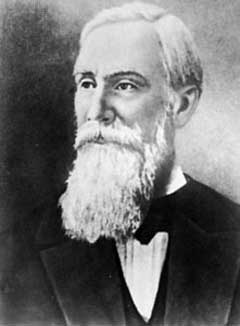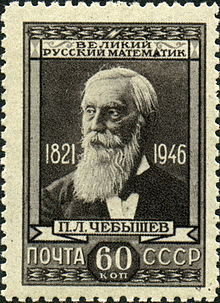Pafnuty Chebyshev
Pafnuty Chebyshev | |
|---|---|
 Pafnuty Lvovich Chebyshev | |
| Born | May 16, 1821 |
| Died | December 8, 1894 (aged 73) |
| Nationality | Russian |
| Alma mater | Moscow University |
| Known for | Work on probability, statistics, mechanics, and analytical geometry |
| Awards | Demidov Prize (1849) |
| Scientific career | |
| Fields | Mathematician |
| Institutions | St. Petersburg University |
| Academic advisors | Nikolai Brashman |
| Notable students | Dmitry Grave Aleksandr Korkin Aleksandr Lyapunov Andrey Markov Vladimir Andreevich Markov Konstantin Posse |
Pafnuty Lvovich Chebyshev (Russian: Пафну́тий Льво́вич Чебышёв, IPA: [pɐfˈnutʲɪj ˈlʲvovʲɪtɕ tɕɪbɨˈʂof]) (May 16 [O.S. May 4] 1821 – December 8 [O.S. November 26] 1894)[1] was a Russian mathematician. His name can be alternatively transliterated as Chebychev, Chebysheff, Chebyshov; or Tchebychev, Tchebycheff (French transcriptions); or Tschebyschev, Tschebyschef, Tschebyscheff (German transcriptions).
Biography
One of nine children, Chebyshev was born in the central Russian village of Akatovo near Borovsk, to Agrafena Ivanova Pozniakova and Lev Pavlovich Chebyshev. His father had fought as an officer against Napoleon Bonaparte's invading army.
Chebyshev was originally home schooled by his mother and his cousin, Avdotia Kvintillianova Soukhareva. He learned French early in life, which later helped him communicate with other mathematicians. A stunted leg prevented him from playing with other children, leading him to concentrate on his studies instead.
Chebyshev studied at the college level at Moscow University, where he earned his bachelor's degree in 1841. At Moscow University, Chebyshev was a graduate student of Nikolai Brashman.
After Chebyshev became a professor of mathematics in Moscow himself, his two most illustrious graduate students were Andrei Andreyevich Markov (the elder) and Aleksandr Lyapunov.
Later he moved to St. Petersburg, where he founded one of the most important schools of mathematics in Russia, and there is today a research institute in mathematics called the Chebyshev Laboratory in that city.
Mathematical contributions
Chebyshev is known for his work in the fields of probability, statistics, mechanics, and number theory. The Chebyshev inequality states that if is a random variable with standard deviation σ > 0, then the probability that the outcome of is no less than away from its mean is no more than :
The Chebyshev inequality is used to prove the Weak Law of Large Numbers.
The Bertrand–Chebyshev theorem (1845,1852) states that for any , there exists a prime number such that . This is a consequence of the Chebyshev inequalities for the number of prime numbers less than , which state that is of the order of . A more precise form is given by the celebrated prime number theorem: the quotient of the two expressions approaches 1.0 as tends to infinity.
Chebyshev is also known for the Chebyshev polynomials and the Chebyshev bias – the difference between the number of primes that are 3 (modulo 4) and 1 (modulo 4).
Legacy

Chebyshev is considered to be a founding father of Russian mathematics. Among his well-known students were the mathematicians Dmitry Grave, Aleksandr Korkin, Aleksandr Lyapunov, and Andrei Markov. According to the Mathematics Genealogy Project, Chebyshev has 10,629 mathematical "descendants" as of 2015.[2]
The lunar crater Chebyshev and the asteroid 2010 Chebyshev were named in his honour.
Publications
- Tchebychef, P. L. (1899), Markov, Andreĭ Andreevich; Sonin, N. (eds.), Oeuvres, vol. I, New York: Commissionaires de l'Académie impériale des sciences, MR 0147353, Reprinted by Chelsea 1962
- Tchebychef, P. L. (1907), Markov, Andreĭ Andreevich; Sonin, N. (eds.), Oeuvres, vol. II, New York: Commissionaires de l'Académie impériale des sciences, MR 0147353, Reprinted by Chelsea 1962
- Butzer, P. L. Chebyshev (1821–1894): A Guide to his Life and Work, doi:10.1006/jath.1998.3289
See also
References
External links
- Mechanisms by Chebyshev – short 3d films – embodiment of Tchebishev's inventions
- Pafnuty Chebyshev at the Mathematics Genealogy Project
- O'Connor, John J.; Robertson, Edmund F., "Pafnuty Chebyshev", MacTutor History of Mathematics Archive, University of St Andrews
- Template:Worldcat id
- Biography, another one, and yet another (all in Russian).
- Œuvres de P.L. Tchebychef (in French)
- 1821 births
- 1894 deaths
- People from Zhukovsky District, Kaluga Oblast
- People from Kaluga Governorate
- 19th-century Russian mathematicians
- Probability theorists
- Imperial Russian inventors
- Number theorists
- Numerical analysts
- Ballistics experts
- Imperial Russian statisticians
- Moscow State University alumni
- Full Members of the St Petersburg Academy of Sciences
- Members of the French Academy of Sciences
- Demidov Prize laureates
- Foreign Members of the Royal Society
- Russian mathematicians










